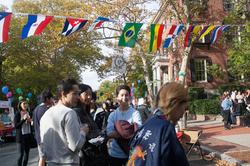Support for Research and Practice

Art and design research, practice and teaching are central to the graduate experience at RISD. We encourage you to explore these opportunities to enhance your graduate program experience through practical application.
Opportunities
Graduate assistantships
Graduate assistantships at RISD provide meaningful and mentored professional training. Most graduate assistantships originate in departments with graduate programs and are assigned by the department’s graduate program director (GPD).
Types of graduate assistantships include:
- program-related (exhibitions, lecture series, accreditation and other types of program enhancements)
- department-based research
- teaching I (high-level assistance of a faculty member in teaching or preparing for a course)
- teaching II (as instructor of record)
- technical (requiring and developing technical skills for the discipline)
Range of pay: $20-$25 per hour.
- assisting a faculty member with a course: $20/hour
- technical assistantships: $20/hour
- program assistantships: $22.50/hour
- research assistantships: $25.00/hour
- faculty of record: $2,500 (each) for team taught courses; $3,375 for single taught
Graduate Commons Grant
The Graduate Commons Grant is a competitive annual grant program that supports creative open-ended explorations and goal-oriented projects. A committee (chaired by the Director of Graduate Studies) will review proposals and determine recipients and final award amounts.
Complete the 2026 Graduate Commons Grant Application Form
Important Dates:
- Monday, March 2, 2026 by 9 pm: application deadline.
- Monday, March 23, 2026: Grant recipients notified
- Wednesday, January 21, 2027: Deadline for 2026 recipient’s Post-Grant Report
The grant period runs from March 23, 2026 – January 21, 2027
Student Eligibility:
- Your Cumulative Grade Point Average (GPA) must be a 3.5 or above.
- You must be enrolled as a full-time graduate student at time of application.
- If you are graduating in Spring 2026, you are eligible to apply.
- If you received a 2025 grant you are not eligible to receive a grant this cycle.
- You may only submit one individual application or be a part of one collaborative application.
- If you have a US Social Security Number (SSN), taxes will not be withheld from the grant award.
- If you are a non-resident of the US and do not hold a US (SSN) you will be taxed on the award amount, up to 30% of the total amount. This tax will be deducted/withheld from your payment.
- All recipients are encouraged to consult a tax professional with any questions.
- This grant does not support attending classes or workshops.
Evaluative Criteria:
- Clarity of the proposal as expressed in the written statement and supporting materials
- Coherent and detailed budget
- Feasibility of proposal
- A clear description of goals or specific outcomes you hope to achieve during the grant period, or how the grant fits into ongoing research or a longer term project.
- Evidence of commitment to your discipline or field of research (as reflected in your work at RISD), and how using the grant will contribute to your creative, intellectual or artistic development
Your application, submitted as one PDF must include:
- Title of Proposal
- Abstract (maximum 50 words). Summarize objectives (goals and anticipated outcomes)
- Proposal narrative (maximum 500 words). Effective narratives include:
- An introductory framework about how this project/research fits into your practice and work at RISD. There are various types of research and this grant is open to different approaches and goals.
- A detailed description of what the focus of your work will be during the grant period
- Description of how you will achieve this work during the grant period in a way that attests to the feasibility of your project.
- Concrete or anticipated outcomes, e.g., complete a body of work for an exhibition/event; ongoing or open ended research into your field or practice
- When relevant you may include up to 5 images.
- Budget request: include materials, equipment, rentals, travel, fabrication, services, other related expenses, and in-kind or other contributions.
- Indicate other grants, if any, you are currently seeking for this project/research (e.g., Maharam Fellowship, etc.)
- Collaborative proposals may include current graduate students in any program, any year, with no limit on the group size. One student must act as the primary contact, who will receive the grant check and will be responsible for managing project funds.
- Curriculum Vitæ (CV) or résumé: No more than 2 pages per person. Everyone in a collaborative proposal must submit a CV/résumé.
Post-Grant Report due: January 21, 2027 must include:
- A summary of grant activity including travel, research, and work successfully completed.
- Significant achievements, discoveries, and insights you developed as a consequence of this grant.
- How you imagine the work completed for this grant will inform your future research or projects.
- Your response to expected and/or unanticipated challenges.
- Description and explanation of any significant changes from the original proposed project/research or budget
- Images (5-8) that represent the outcome of the grant
NOTE: Images and information about recipients’ grant activities may be included on RISD’s website and other materials.
Questions? Contact Graduate Studies
Graduate Commons Project assistantships
These assistantships are hosted by the RISD Museum, Co-Works, RISD Careers, Fleet Library, Center for Arts & Language, Nature Lab, RISD Global, RISD Research and other offices are also available each year. In addition, faculty may identify a research assistant for their own research projects.
Graduate students can view open opportunities by visiting Artworks, the job board hosted by RISD Careers.
Conference & Exhibition Fund
The Conference & Exhibition Fund is no longer accepting applications.
Applications are accepted and reviewed on a rolling basis each year.
Established to support professional development, the Graduate Student Conference & Exhibition Fund assists graduate students who have been invited to present creative or scholarly work at an exhibition, conference, symposium, or residency. The fund can be used to cover travel, accommodations, and meals.
Make sure to apply at least three weeks before the event is scheduled. Follow the steps below to apply:
- Present your invitation/acceptance letter to your GPD.
- Your GPD will then complete a form (provided by Graduate Studies) to initiate the process.
- Once the form has been received, you will be contacted by Graduate Studies.
Award amounts vary and do not exceed $1,000 (this includes the per diem). Awardees need to request a per diem* for food and incidentals at 3 weeks before the event. After attending the event, you submit your expenses and will receive funds in the form of reimbursement.
For complete information, view the Conference & Exhibition Fund details.
Questions? Contact Graduate Studies
Teaching as practice
Graduate students interested in teaching and pedagogy find many opportunities to begin developing a teaching practice while at RISD. In addition to offerings through the Department of Teaching + Learning in Art + Design (TLAD), RISD offers electives, workshops and lectures focused on collegiate teaching.
Interested graduate students also have opportunities to teach in their major, either as a teaching assistant or instructor of record for an introductory course. Wintersession also offers graduate students opportunities to develop and propose original courses of their own design. Interested students should speak to their GPD to learn about Wintersession teaching opportunities. (See below for more information.)
Those with interests in pursuing teaching opportunities in higher education may also choose to enroll in the Collegiate Teaching Certificate Program.
Teaching an original course during Wintersession
Teaching an original course during Wintersession
The intensive, five-week Wintersession (WS) term between the Fall and Spring semesters provides graduate students with a unique opportunity to teach a course of their own design. To apply, interested students, in consultation with their Graduate Program Director (GPD), submit a proposal in the spring term prior to the next Wintersession.
To be eligible to teach a self-designed WS course, you must:
- Speak with your GPD before January 9, 2026 if interested in developing a course for WS2027.
- Be in the second or third year of your program by the time the course would run (WS 2027).
- Your Cumulative Grade Point Average (GPA) must be a 3.5 or above.
- Participation in the following is required for all grads who want to propose a an original course:
- Part I of the syllabus writing workshop late WS/early spring (no credit). Part II is required for those approved by the WSC to continue developing a course proposal.
- 1.5 credit teaching prep workshop, Fall 2026*
- 1.5 credit teaching support course, WS 2027*
- The fall and WS workshops are NOT required if you are pursuing the Certificate in Collegiate Teaching in Art and Design (CTAD).
Teaching a department-issued course provides excellent teaching experience. Speak with your Graduate Program Director (GPD) to learn more.
Timeline for teaching in Academic Year 2026–27
Before January 9, 2026: Speak with your GPD about your interest in developing a course. Note that this is a highly competitive process and not all course proposals will be approved.
Week of January 19: Grads approved by their GPDs to be considered for teaching in WS2027 will be required to take Part I of a syllabus workshop offered by Grad Studies.
February 9: Grads who have completed the Part I of the syllabus workshop, submit a draft course description (250 word max) and 2-4 learning outcomes to Grad Studies.
February 9 – March 4: All drafts of the submitted course descriptions (250 word max) and 2-4 learning outcomes will be reviewed by the Wintersession Committee (WSC).
March 4: Students will be notified about the status of their proposals by Grad Studies.
Week of March 9: Part II of the syllabus workshop for grads approved by the WSC.
March 9 – April 14: Approved grads continue to work with their GPDs on their course proposal.
March 21: Department Resource Request form due to Grad Studies.
April 14: All course proposal materials are due to Grad Studies. Course proposal materials include:
- Course description
- Syllabus
- Resource Request form
- Resume/CV (if co-taught, need CVs for both instructors)
April 14 – May 1: All proposals continue through the standard approval process for all courses at RISD.
May 1: Grad Studies will notify grads about the final status of their course proposal.
The payment rate for teaching an original course in Wintersession is; $5,750 for single taught, $4,320 each for team taught.
Department contacts for current students
Architecture
Ceramics
Digital + Media
Furniture Design
Global Arts and Cultures
Graphic Design
Illustration
Industrial Design
Interior Architecture
Jewelry + Metalsmithing
Landscape Architecture
Painting
Photography
Printmaking
Sculpture
Teaching + Learning in Art + Design
Textiles
Get to know RISD
Student Employment assists students and supervisors in all aspects of on-campus student employment including graduate assistantships.
Through RISD's Career Center, you'll find help discovering internships, jobs, freelance work, grants, exhibitions and more.
ISSA guides our international students on what you need to do to legally work in the US—at RISD and off campus, before and after graduation.


